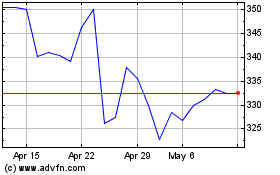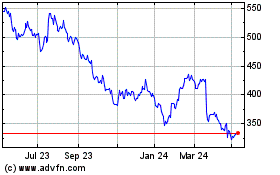Adidas Signs Eyewear Licensing Deal
September 03 2015 - 12:50PM
Dow Jones News
German sportswear firm Adidas AG said Thursday it had signed a
license agreement with a small Italian company, Italia Independent
SpA, to make eyewear for its Adidas Originals collection, as both
firms try to boost their brands by tapping into a larger customer
base with medium-priced eyewear.
The agreement, which will last four years, also marks a
different approach to licensing, typically one of the most
important sources of revenues for eyewear makers, at a time when
the sector is undergoing massive reorganization. Companies such as
Luxottica—a sector giant with €7.7 billion ($8.54 billion) in
annual revenue—have made their fortune through signing licensing
agreements with luxury goods houses such as Armani and Chanel.
Others, like French conglomerate Kering SA—owner of Gucci and Saint
Laurent—have recently decided to bring eyewear production in-house
to have a closer tie on distribution and full revenues rather than
only royalties.
Adidas has been trying to lift its street cred lately after
losing market share in the sportswear and apparel segments in the
U.S. Its Adidas Originals line is aimed at a young and urban crowd
and includes streetwear, retro sneakers and accessories like bags,
hats and watches. Last year, Adidas signed a design and marketing
deal with rapper Kanye West to boost sales at its Originals unit.
It also collaborates with other famous artists including singer
Rita Ora and rapper Pharrell Williams.
In the first half of the year, Adidas reported a double-digit
sales increase at its Originals business.
Unlike traditional licensing agreements, the new eyewear
collection will bear both companies' names. Italia Independent,
founded in 2007, says it will try to build brand awareness through
its association with Adidas. "This deal comes at a time when we
need an important communication boost," said Italia Independent's
Chief Executive Andrea Tessitore.
The new eyewear will have an average price of €90—lower than
most luxury-goods firms' products which, according to Mr.
Tessitore, is the largest share of the market.
"There's a strong appetite for aspirational products at an
adequate price," said Mr. Tessitore. "The share of the luxury
eyewear segment, with prices over €200, makes only about 10% of the
total market in Europe, but there are so many players there. The
bulk of sales are in the lower price segment."
Italia Independent, whose annual revenues were €33 million, up
32% compared with the previous year, is trying to cash in on the
deal, both in terms of increasing popularity and sales. But many
other players have taken opposing strategies as licensing is seen
as increasingly unstable.
Recently, Kering decided to cancel its licensing agreement with
another Italian eyewear maker, Safilo, which had a significant part
of its revenues coming from the deal. Kering said that it estimated
that the group's eyewear sales, which includes products for 11
brands, could be about €350 million, but because of the licensing
agreement in place, the French conglomerate only got a tiny portion
of it in royalties.
Given the instability of the licensing business, Safilo recently
decided to also focus on proprietary brands to avoid being too
dependent on licensing, Chief Executive Luisa Delgado said in an
interview last year.
Luxottica, on the other hand, has always kept a fairer balance
between its own brands, such as Ray-Ban and Oakley, its retail
activities and the licensing agreements with luxury houses, which
supported the company's constant growth in the last decades.
The new collection will be presented in January 2016, the
companies said.
Write to Manuela Mesco at manuela.mesco@wsj.com and Ellen
Emmerentze Jervell at ellen.jervell@wsj.com
Subscribe to WSJ: http://online.wsj.com?mod=djnwires
(END) Dow Jones Newswires
September 03, 2015 12:35 ET (16:35 GMT)
Copyright (c) 2015 Dow Jones & Company, Inc.
Kering (EU:KER)
Historical Stock Chart
From Apr 2024 to May 2024

Kering (EU:KER)
Historical Stock Chart
From May 2023 to May 2024
